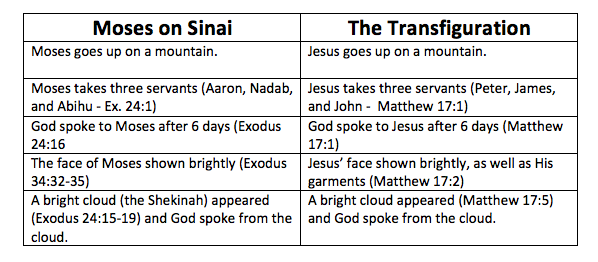In Luke 9:30-31, while presenting the scene of transfiguration, the writer notes both the presence of Moses and Elijah on that occasion along with a glimpse into the conversation they shared with the Lord:
- “And behold, two men talked with Him, who were Moses and Elijah, who appeared in glory and spoke of His decease which He was about to accomplish at Jerusalem.
The word rendered “decease” would be better rendered “Exodus”. This better rendering is more clearly understood when the transfiguration scene as a whole is considered in light of the first Exodus.
When Moses appeared on the Mt. of Transfiguration, it is no coincidence that the topic he begins discussing with Jesus is the upcoming Exodus. As significant as the Exodus under Moses was in the Old Testament, the New Exodus under Christ far excels it.
Though the connection between the Exodus under Moses is often made with the New Exodus under Christ, many fail to realize the significance of the en masse nature of both Exoduses. While every individual Israelite that was saved through the grace of God and crossing of the Red Sea, the Exodus was also understood as the saving of a nation, not merely individuals. To put it another way, salvation occurred both individually and en masse. In order for Israel to receive the covenant at Sinai and the inheritance of the promised land, every individual had to share in their relationship to the rest of the nation. Even though Caleb and Joshua did not consent with the other faithless spies (Numbers 13), neither man was blessed with an inheritance separate and apart from the rest of the nation.
Like the first Exodus, though each person must now pass through the waters of baptism in order to be saved (Romans 6:1-4; 1 Corinthians 10:1-2) and the wilderness of this life (1 Corinthians 10:1-5), not one will receive the inheritance of the promised land of heaven separate and apart from the spiritual kingdom of God (the church). Paul put it this way,
- For the husband is head of the wife, as also Christ is head of the church; and He is the Savior of the body. (Ephesians 5:23).
Christ did not come merely to save the individual. He came to establish His church (Matthew 16:18) and through it to offer redemption to the world (Acts 2:47). To argue that men can reach heaven without the church is to argue that an Israelite could receive their inheritance without the nation of Israel.
Nicholas Perrin hit the nail on the head in his book “Finding Jesus in the Exodus” when he stated,
For further discussion on the Transfiguration and the connections between it and the Exodus, please check out our video presentation the the Transfiguration from the Matthew Study.




 RSS Feed
RSS Feed
